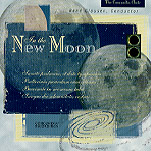Choral music fans are in for a real treat–and those who choose to pass on this exemplary program and its rarely heard masterpieces will just have to be satisfied with their aesthetically diminished lives. Too strong, perhaps? You won’t think so when you’ve been through the alternately prickly and sensuous Agnus Dei settings by Penderecki and Sven-David Sandström, or Max Reger’s magnificent and arrestingly beautiful O Tod, wie bitter bist du. The performance of the Reger piece alone (the only one on the program recorded live) is worth the price of the disc. We also hear Distler’s Singet dem Herrn, Górecki’s Totus Tuus, and the Sanctus from Frank Martin’s Mass for Double Chorus. For many listeners, the point of first attack will be John Tavener’s Song for Athene, which, a sticker on the cover reminds us, was “sung at Princess Diana’s funeral.” None of this is easy music; much of it is at the high end of difficulty. But the Concordia Choir seems totally undaunted by the technical challenges, and gives its finest performances on disc. My only complaint is the lack of information about the music in the liner notes. Yes, the music can speak for itself, but most of these pieces will be unfamiliar to the majority of listeners, and a little context is always welcome.
































